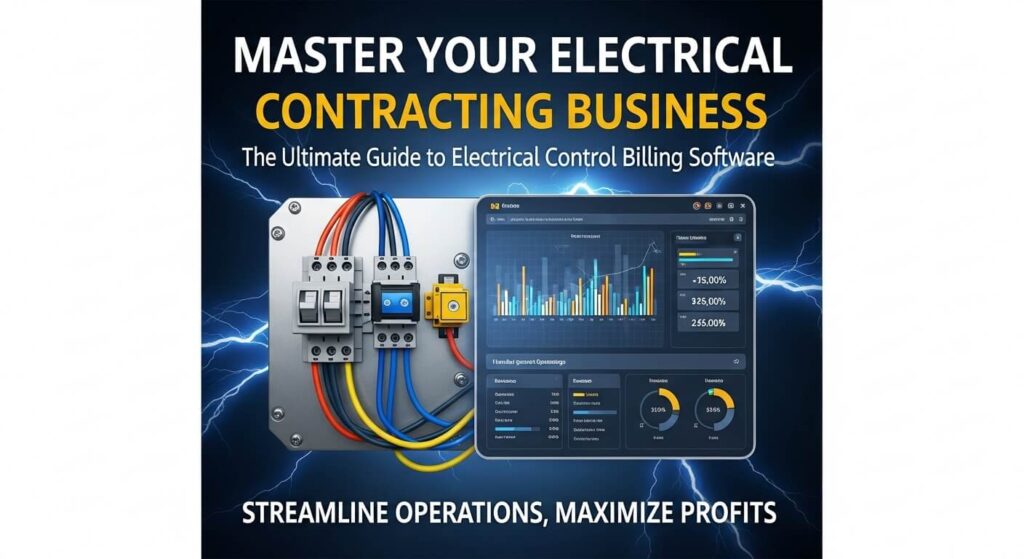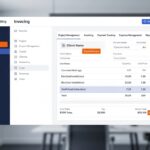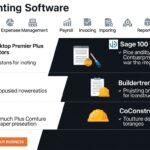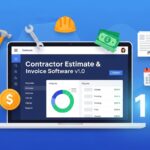
Master Your Electrical Contracting Business: The Ultimate Guide to Electrical Control Billing Software
Running an electrical contracting business can be thrilling, but managing finances often brings headaches. Are you tired of manual errors slowing you down? Do delayed payments constantly squeeze your cash flow? Many electrical contractors face these exact struggles, impacting their bottom line. The good news is, there’s a powerful solution for these common challenges.
Electrical control billing software is designed specifically for your industry. Its core purpose is to streamline invoicing, track projects, and manage payments with ease. Imagine boosting accuracy, improving efficiency, and seeing real gains in your company’s profitability. This specialized software makes it all possible.
Why Electrical Contractors Need Specialized Billing Software
Addressing the Unique Demands of Electrical Projects
Electrical work has its own unique complexities that generic billing tools just can’t handle. You’re not simply selling a product off a shelf. You must meticulously track every wire, conduit, fixture, and piece of specialized equipment used on a job. Labor tracking is just as detailed, separating tasks like installation, testing, and troubleshooting. Furthermore, managing change orders is a constant reality. Your billing must comply with strict industry standards and local codes. For those long-term projects, you also need robust progress billing capabilities.
The Cost of Inefficiency: Manual Billing Pitfalls
Sticking with manual billing processes costs your business more than you might think. Countless hours are wasted on data entry and tedious reconciliation. This increases the risk of human error, which can lead to underbilling or even overbilling clients. Such mistakes chip away at your profit margins. Delayed invoicing and constant payment follow-ups also put a serious strain on your company’s cash flow. Studies show that a staggering 5-10% of project revenue can be lost in the trades due to billing errors.
Enhancing Professionalism and Client Trust
Professional, accurate, and timely invoices build immense credibility with your clients. From their perspective, clear breakdowns of costs demonstrate transparency. They appreciate seeing exactly what they are paying for. Easy payment options also improve the client experience. Organized billing systems prevent disputes and help foster stronger relationships, often leading to valuable repeat business.
Key Features of Effective Electrical Control Billing Software
Project Management and Job Costing Integration
The best electrical billing software links directly to how you run your projects. It helps track every material used per job. You can monitor labor hours against initial estimated budgets in real time. This gives you current updates on project profitability. For example, a contractor can see the exact labor and material costs going into wiring a new commercial building as it happens.
Time Tracking and Labor Management Tools
Capturing accurate time is absolutely crucial for proper electrical billing. Look for software offering mobile time entry options for your field technicians. This makes logging hours simple and immediate. The system should categorize labor by specific tasks, like rough-in work, fixture installation, or testing. It can also manage overtime calculations, ensuring everyone gets paid correctly. Make it a practice for field staff to use mobile apps for immediate time logging to prevent lost hours.
Material Tracking and Inventory Management
Effective software helps manage the cost of goods sold for all your electrical jobs. It links materials purchased directly to specific projects. Inventory levels update automatically once a job is done. The system also manages markup on materials, ensuring you always charge fair and profitable rates. Picture software that lets your team scan barcodes of electrical components right as they’re installed on-site.
Invoicing and Payment Processing Capabilities
The core of any billing software lies in its invoicing power. You will want customizable invoice templates featuring your company’s branding. It should support various billing methods, including hourly rates, fixed-price contracts, and progress billing. Integration with payment gateways allows clients to pay online using credit cards or ACH transfers. Automated invoice reminders and late payment notifications help keep your money flowing.
Change Order Management
Handling scope changes effectively is a big deal in electrical contracting. Good software lets you create and track change orders right inside the system. You can even get client approval digitally. This automatically updates project costs and invoices based on all approved changes. An industry consultant once stated, “Poorly managed change orders are a silent killer of contractor profits.”
Benefits of Implementing Electrical Control Billing Software
Improved Accuracy and Reduced Errors
Automation within the software greatly minimizes manual data entry errors. This means fewer billing mistakes, directly boosting your profit margins and increasing client satisfaction. Businesses often see a significant reduction in billing disputes after implementing such specialized software.
Enhanced Cash Flow and Faster Payments
There is a direct connection between efficient billing and your company’s financial health. Generating invoices faster naturally leads to quicker payments. Automated reminders mean fewer overdue accounts to chase. Offering online payment options also provides your business with immediate cash. An actionable tip is to set up automated payment reminders for all invoices over 15 days past due,
Increased Operational Efficiency
Imagine the time savings across all your administrative tasks. Less time gets spent on manual data entry, reconciliation, and constantly chasing payments. This frees up your team to focus on business development, project planning, and excellent customer service. One electrical contractor reduced their administrative overhead by 20% after adopting specialized billing software.
Better Project Profitability and Decision Making
Data-driven insights from your software lead to much smarter business decisions. You gain access to real-time job costing data. This allows you to easily identify your most profitable jobs and clients. You can then use this information to craft better pricing strategies for all future projects. A CPA specializing in construction accounting advises, “Accurate job costing is the bedrock of sustainable growth for any trade business.”
Choosing the Right Software for Your Electrical Business
Assessing Your Business Needs and Size
Deciding on the best software means figuring out what your business truly needs. Consider your volume of jobs, how many employees you have, and how complex your projects are. Evaluate specific features that are a must-have, such as mobile access or certain integrations. Before you even start looking at options, make a checklist of all your essential features.
Key Considerations: Cloud-Based vs. On-Premise
You’ll need to weigh the pros and cons of cloud-based versus on-premise software. Cloud-based options offer easy accessibility from anywhere and automatic updates. They also have lower upfront IT costs. On-premise solutions give you greater control over your data but might require a higher initial investment.
Integration with Existing Systems
Seamless data flow is incredibly important. Make sure the software is compatible with your current accounting software, like QuickBooks or Xero. Look for integrations with your CRM or project management tools as well. For example, software that can automatically sync invoice data with your main accounting ledger saves huge amounts of time.
User-Friendliness and Training
An intuitive interface is key for smooth adoption. The software should be easy for both your office staff and field technicians to learn. Check for available training resources and reliable customer support. Request a live demo and involve key team members in the evaluation process. This ensures the chosen software fits everyone’s needs.
Implementing and Maximizing Your Software Investment
Data Migration and Setup
The initial setup process requires some attention to detail. Take time to accurately migrate all your existing project and client data. Correct initial configuration ensures the software performs as expected from day one. This groundwork sets your business up for future success.
Training Your Team for Success
Technology adoption always involves a human element. Provide comprehensive training for everyone who will use the software. It helps to identify “software champions” within your team. These people can then support others and promote best practices. Schedule regular refresher training sessions to ensure continued effective use.
Leveraging Reporting and Analytics
To truly get the most out of your software, dig into its data. Use the reports for financial analysis, checking project performance, and gaining operational insights. Track key performance indicators (KPIs) related to billing and overall profitability. You can use these reports to identify which types of electrical jobs consistently bring in the highest profit margins.
Conclusion
Building a More Profitable Electrical Future
Specialized electrical control billing software plays a critical role in modern electrical contracting. It is more than just a tool; it’s a strategic asset for your business. By embracing this technology, you gain improved accuracy, greater efficiency, enhanced cash flow, and ultimately, much higher profitability.
Investing in the right solution for your business is a smart move. It’s an investment in your company’s financial health and long-term growth. Explore your options today and choose the electrical billing software that will power your business forward.










